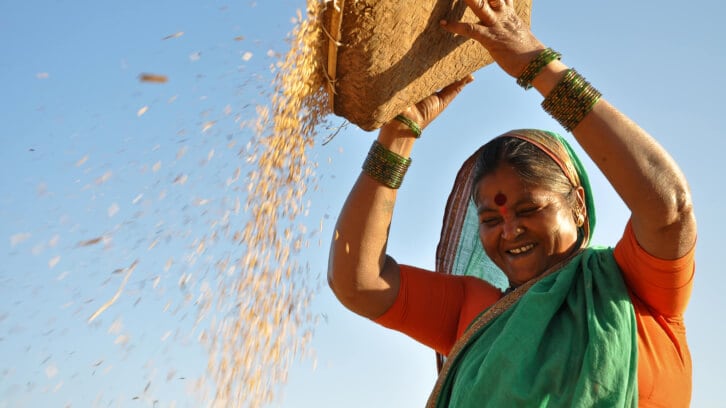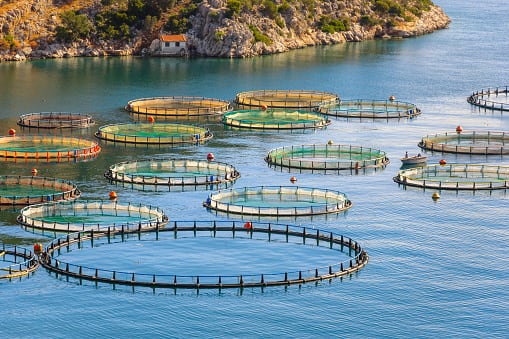The country’s food system plays a vital role in achieving the country's Sustainable Development Goals (SDGs) by 2030. However, it still falls short in terms of sustainability across multiple dimensions, including nutrition, environment and economics.
According to the National Institution for Transforming India (NITI Aayog), which publishes annual reports on the progress of each Indian state and Union Territory towards the SDGs, the country's food system is failing to fulfil its function in these critical areas.
Neglecting nutrition
The Indian food system also faces challenges in meeting nutritional requirements. Despite high production volumes, around 30% of the world's stunted children and 45% of wasted children reside in India. Deficiencies in essential vitamins and minerals persist among a significant proportion of the population, even for those with sufficient income to afford a healthy diet.
The malnutrition problem in India surpasses that of countries with lower income levels, including neighbouring South Asian nations and several Sub-Saharan African countries. Moreover, the country is grappling with an increasing prevalence of overweight and obese individuals, leading to a rise in non-communicable diseases and associated deaths.
Environmental and economic challenges
Environmental sustainability is a significant concern, with Indian food systems causing considerable negative impacts on air, water, land, biodiversity, climate, and human health.
The cultivation of crops across approximately 60% of the country's land area and the extensive use of freshwater resources lead to soil degradation, salinisation, and groundwater depletion. The agricultural sector is responsible for 18% of India's total greenhouse gas emissions, primarily due to factors such as a large livestock population, excessive fertiliser application, extensive rice cultivation and the burning of crop residues. These environmental issues must be addressed to meet India's commitments under the Paris Climate Agreement.
Economically, the food sector employs over half of India's population but contributes under 20% to the national gross domestic product (GDP). The majority of farmers, particularly small landholders, live in poverty. Lack of access to education, credit, infrastructure and technology exacerbates the issue, resulting in high yield gaps and smaller profits for farmers. Income disparities between farmers and non-farm workers persist, and the country has witnessed widespread agrarian distress and farmer suicides in recent decades.
The way forward: Data, education, and government efforts
Research suggests that India’s population must increase their consumption of vegetables, fruits, pulses, nuts and coarse grains, while decreasing sugar, rice, wheat and oil intake. Promoting sustainable food choices and discouraging unsustainable items through data-driven information can be instrumental in achieving these goals.
Recent advancements in sustainability data analytics and the development of multiple indicators have enabled scientists to design region-specific sustainable and optimised diets that meet nutritional needs while adhering to environmental boundaries.
In a recently published article, researchers from the Indian Institute of Technology (IIT) suggested that increased investment in data collection efforts would be required to ensure the accuracy of sustainable diet estimates and the reliability of sustainability indicators.
They further said Indian retailers should follow in the footsteps of private retail supermarkets in foreign countries, which have commissioned studies to assess the nutritional and environmental footprints of their products, thereby improving sustainability throughout the supply chain.
On the part of government and funding agencies, more resources should be allocated to data collection and R&D to bridge existing knowledge gaps. Additionally, the government can utilise sustainability data to support farmers by increasing the minimum support price of crops such as millet, encouraging their cultivation and promoting sustainable items through education campaigns and inclusion in public distribution systems.
The success of government efforts to transform the Indian food system will depend on the cooperation of food producers, consumers and businesses. Farmers must leverage incentives to improve efficiency and diversify crop production, while consumers need to adopt sustainable dietary behaviours.
Businesses should invest in agri-tech advancements to increase farm and supply chain efficiency, as well as develop innovative product formulations that incorporate healthier and sustainable ingredients without compromising taste or affordability.
Ultimately, achieving a sustainable food system in India requires breaking silos and fostering multi-sectoral collaboration among ministries and stakeholders. Each actor in the food system must contribute their part to facilitate this necessary paradigm shift towards sustainability.
Source: Indian Pediatrics
“Sustainable Food Systems: The Way Forward in the Indian Context”
https://www.indianpediatrics.net/epub032023/SA-00516.pdf
Authors: Abhishek Chaudhary, et al.




